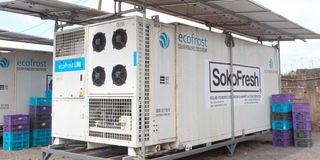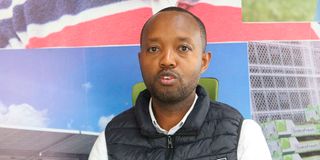Solar coolers come in handy for Delta mango farmers

Solar-powered coldroom units at the SokoFresh workshop in Wangige on February 12, 2025.
What you need to know:
- Some 54,472 kilos of mangoes have been preserved in these coldrooms in Tana River.
- For those looking for a coldroom, prices range from Sh3.5 million to Sh5 million.
Standing next to her wooden stand in Makere village, Tana Delta division, Halima Amasa gestures towards ripe mangoes, their skins softening under the midday sun.
“The fruits go to waste but not as much as it used to happen. Previously, we harvested a lot but the market was slow. We had no proper stores,” she says.
Two seasons ago, Amasa made Sh200,000 from her 1,200 mango trees and 600 lime trees. However, many fruits went bad.
“We only sold a small portion daily as the market wasn’t always ready for bulk purchases,” she says.
Amina Bocha, a member of Makere Women Farming Association, says she used to leave many fruits in the farm as there was no guaranteed market or proper stores.
Things took a turn for the better last year, when solar-powered portable coldrooms were introduced to Makere.
The programme by Concern Worldwide set up cold storage units in Makere, Kumbi and Hewani villages, benefiting at least 1,100 farmers, according to Kones Cheruiyot, a senior programme officer at the NGO.
As a result, some 54,472 kilos of mangoes have been preserved in these coldrooms in Tana River – surpassing the target of 180 kilos.
“The coldrooms prolong the shelf-life of fruits as farmers look for market,” Cheruiyot says.
The coldrooms are in two models. Farmers can opt for bundled service, where SokoFresh – the seller – handles storage and market connections, or a standalone leasing option, where individuals or farmer groups rent a unit for Sh80,000 a month.
Makere village is not connected to the national electricity grid, meaning is almost impossible for locals to invest in cold storage units and keep their produce fresh for long.
“Options like freezers and fridges are not practical in Makere village. Even if power is made available, the cost of buying and running one would be too high for smallholder farmers like me,” Amasa says.
For those looking for a coldroom, prices range from Sh3.5 million to Sh5 million.
Hamisi Kongolo, a farmer, says using coldroom has reduced production costs.
“One only pays Sh2 per kilo of stored fruit as the NGO covers the remaining,” Kongolo says.

SokoFresh Chief Executive Officer Mr Dennis Karema on February 12, 2025.
A unit is powered by 14 solar panels, each generating 345 watts and producing 5.17kw.
The technology retains up to 87.14 per cent of stored fruit in good condition, according SokoFresh CEO Denis Karema.
He adds that solar-powered cold storage is effective in the arid Tana Delta.
The solar powered cold storage units have internet-connected systems that track usage and temperature changes in real time.
“We can see how frequently the doors are opened and assess temperature variations. This minimises spoilage,” says Stephen Wasike, the operations and maintenance officer at SokoFresh.
“We monitor ambient temperature which is simply outside of the room. With this, we can tell the heat load during the day.”
The coolers have given farmers time to negotiate for better mango prices. Mangoes now go for Sh17 a kilo and lime fruits at Sh29, compared to the previous Sh12 and Sh16 respectively.
“Thank God, I made profits after many years in farming,” Bocha says.
Makere Women Farming Association members say while they see the potential of cold storage, securing funding to buy the units remains their greatest challenge.
The units in use were introduced with NGO support, but farmers will eventually need to shoulder the costs.
Amasa and other group members are pooling resources and pursuing other funding options to lease cold storage units during the October to March mango season.
They hope the government will step in to subsidise costs or provide additional funding.
Tana River Agriculture Executive, Mwanajuma Hiribae, says the devolved government is training farmers on post-harvest handling, sorting, grading and cooperative marketing.
“Utilising solar tools on farms remains a priority for the county. It will be implemented in due course,” she says.
newsdesk@ke.nationmedia.com


